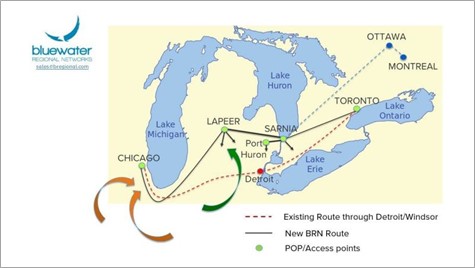Bluewater Regional Networks COO Chris Gould said that the Ciena Waveserver platform “checked all the boxes”
Bluewater Regional Networks (BRN), a Canadian community-owned network provider, announced that it is using Ciena’s Waveserver Ai compact interconnect platform for a new cross-border network between Canada and the U.S. to offer a high-capacity, flexible network that will running from Sarnia in Southwestern Ontario in Canada to Port Huron, Michigan.
First announced in January 2021, the network avoids Toronto, Chicago, Detroit and Buffalo, making for a shorter, more direct path. BRN partnered with 123NET, a Michigan-based network and internet service provider, to deploy the terrestrial network along the Sarnia-Port Huron border crossing.
“To stay competitive in a digital economy, companies large and small need to have fast, reliable connectivity. With the new route, we can address underserved needs in Ontario and Michigan with network solutions that provide redundant and diverse connectivity,” BRN’s COO Chris Gould said, adding that Ciena’s Waveserver platform “checked all the boxes.”
“Right out of the gate we’re able to offer the same technical capabilities and quality of experience to our wholesale and commercial partners as the big transport guys,” he said.

Ciena’s Waveserver Ai uses WaveLogic Ai and WaveLogic 5 Extreme coherent technology to support per-wavelength capacities up to 800 Gbps. Further, due to the platform’s intuitive installation process and zero-touch service provisioning capabilities, Bluewater said it was able to “get the network up and running quickly.”
A primary focus for Bluewater Regional Networks and its partners, according to a Ciena blog, was redundancy and diversity: “Both redundancy and diversity are key networking schemes, as they help keep networks online even if a primary connection goes down. The new Sarnia-Port Huron route is not only a low-latency and cost-efficient alternative to interconnect business across the border, but it’s also a potential diverse path that can add substantial resiliency to existing cross-border networks.”
This recent announcement comes less than a month after Bell Canada claimed to be the first Canadian carrier to offer 5G roaming in the U.S., pointing to the easing of Covid-19 border restrictions between the U.S. and Canada as a key motivator stating that Canadians want to “bring the speed and power of mobile 5G with them.”

